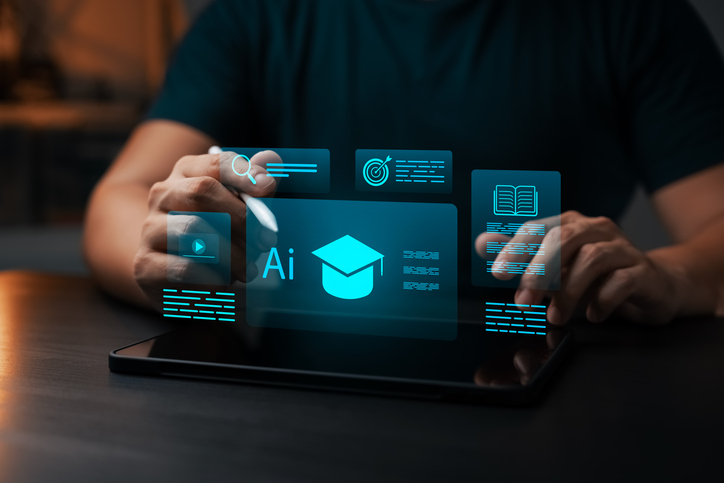Choosing An AI Degree Program: What To Know
What students considering entering the AI field should keep in mind when pursuing a college degree.

Tools and ideas to transform education. Sign up below.
You are now subscribed
Your newsletter sign-up was successful
New AI programs are popping up at higher ed institutions across the country at the graduate and undergraduate level. These programs seek to meet the growing demand for AI experts who can help design this technology but also help society navigate it.
I recently spoke with educators at two of these programs to seek their advice about what students entering the field should keep in mind when studying AI in college and pursuing an AI degree.
Choosing An AI Degree Program: Assess Your Math Skills
The first question a potential AI student will want to consider is how dedicated they are to math. Working on the programming side of AI generally requires a strong foundation in math, says Henry Wu, a professor who teaches in Western Connecticut State University’s new M.S. Artificial Intelligence Program.
“We offer a strong foundation in mathematical computing and machine learning to prepare the students to get more advanced skills in the areas of deep learning and natural language processing and many other related fields,” Wu says.
So if math is not your talent, a program such as WCSU’s might not be the right fit. Instead, Wu notes there might be opportunities in programs that focus more on downstream aspects of AI, such as prompt engineering. Learning how to effectively communicate with AI, for instance, could be an increasingly valuable skill in society.
Atri Rudra, chair of the newly launched Department of AI and Society at the University of Buffalo, says that the AI field needs input from non-math enthusiasts as well. Though he notes that sometimes getting an understanding of AI models requires less math than people think.
“You just need some concepts from algebra, some concepts from probability,” he says. “Sure, if you know calculus, some of these things become easier, but it's not inherent to these concepts."
Tools and ideas to transform education. Sign up below.
Focusing on Foundational Skills And Avoiding AI Snake Oil
Rudra says that students should focus on programs that emphasize the fundamentals of AI rather than how to use certain AI tools.
“Fundamentals and concepts in the long run will always serve you better than learning because tools change quickly,” he says. However, if you focus on fundamentals, you’ll be able to adapt to changing tools and be prepared for a rapidly evolving field such as AI.
Wu says that some in the AI education space are out to “just make a profit,” with lessons that aren’t practical. “Can the student really apply those learnings in the real world? They probably don't care that much. So that's something we need to avoid,” he says.
He adds that one red flag are programs or so-called AI experts that make overly bold claims about what AI can do. “You cannot say AI is some kind of magic. You cannot portray it as snake oil.”
Wu notes this has become more common in recent years. “Everybody wants to get a piece of the pie of the AI boom,” he says.
Keeping AI’s Impact in Mind
If you’re studying AI in college, you want to remember the impact it might have on the world as a whole.
“Many people think AI can do everything,” Wu says. “It can solve everything for humans. But in reality, it is very specific.” He adds that generally, each model can only target one type of problem. For instance, at WCSU, the AI team is working with the nursing department to create a training model for diagnoses. General AI models normally can’t perform this type of specific task.
Rudra says students who study AI at the University of Buffalo and work in the AI field after graduation will be trained to think of the ethical impacts of the technology.
“I don’t expect our students to go be activists in these companies,” he says. “But as our students rise up in the hierarchy, and they get to manager positions, places where they can make decisions, then they can ask those questions that need to be asked.”
He adds, these questions could include ones such as, “'Have you taken the society into account?' 'Have we talked to the right people in the community?' So it's kind of planting that seed in their mind."
Author’s note: I also teach as an adjunct at WCSU but do not work directly with the AI program or Professor Henry Wu.
Enjoy our content? Make sure to add Tech & Learning as a preferred source on Google to keep up with our latest news, how-tos, profiles, events, and more.
Erik Ofgang is a Tech & Learning contributor. A journalist, author and educator, his work has appeared in The New York Times, the Washington Post, the Smithsonian, The Atlantic, and Associated Press. He currently teaches at Western Connecticut State University’s MFA program. While a staff writer at Connecticut Magazine he won a Society of Professional Journalism Award for his education reporting. He is interested in how humans learn and how technology can make that more effective.

